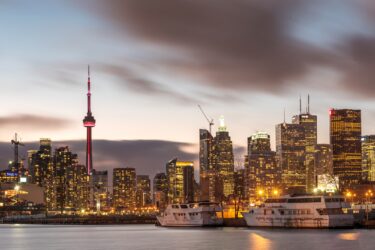Ontario allowed film productions to continue despite concerns of COVID-19 as the province entered its second lockdown on Jan. 2.
Toronto’s film industry has seen exponential growth over the last decade and even with stay-at-home orders issued by Premier Doug Ford in early January, film productions got the go-ahead to continue their shoots.
Director’s Guild of Canada member Mark Pettit said there is a higher level of awareness around safety protocols and that’s what’s kept productions running.
“It depends on the tier of the show. A tier-A show will actually test me two days before my first day of work,” Pettit said.
“Any Tier A, B or C production have tripled their overheads in order to limit their liability their risk exposure to COVID — they’ve tripled it. We had an entire COVID team on [Star Trek Discovery] where I was COVID third, and I had a team of about six to 10 people that were wiping down surfaces and monitoring for social distancing reporting any cases of non compliance,” he said.

Toronto has doubled as other major cities in films such as Suicide Squad and Resident Evil: Apocalypse. Filming continues despite COVID-19 restrictions. (Alex Shutin/Unsplash)
Toronto has become Midway City for Suicide Squad, a futuristic Tokyo under attack by gargantuan Kaiju in Pacific Rim and even saw the zombie apocalypse for Resident Evil: Apocalypse.
What Toronto is dealing with currently, alongside the rest of the world, is the COVID-19 pandemic which has made large gatherings — something film sets are known for — nearly impossible, if not illegal. As a result, companies are turning to areas outside the GTA for productions that can fly under the radar.
Constantin Films’ reboot of Resident Evil recently wrapped production in Sudbury, Ont., which is well removed from GTA crowds and limits crew work to local residents.
Claude Joli-Couer, the government film commissioner and chairperson of the National Film Board of Canada, says work will continue and contracts will be honoured.
“A number of filmmakers are continuing to work remotely from home on their project, when possible, respecting the public health directives regarding physical distancing,” he said in an open letter.
“As the crisis evolves, we will continue to adapt, to ensure that many of our productions continue and that post-production workflows can be performed remotely. Based on public health and safety regulations, we will begin to gradually offer our complete suite of post-production services as well as our animation production spaces,” Joli-Couer said
When the lockdown took effect, some unions and production houses sent letters to crew members to carry with them. The letter was an identification form that would prevent any police disbursement under the COVID-19 bylaw limiting large gatherings.
When crew members have tested positive for the virus, the production is shut down immediately, even midday if necessary.
ACTRA, the Toronto-based union for actors in Ontario, put a number of safety measures in place including paying dues online, continuous screening for their members and mental health support links.
The union’s president David Gale reaffirmed ACTRA is ready to manage the pandemic.
“No one ever really knows what lies around the corner. We must be able to turn on a dime. We must be prepared for whatever is thrown our way,” Gale said.
